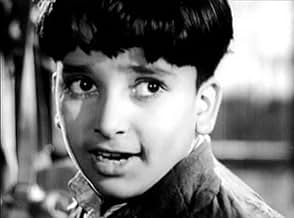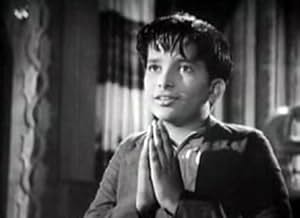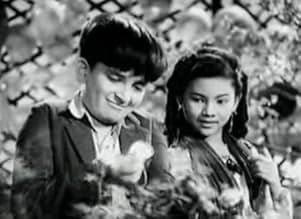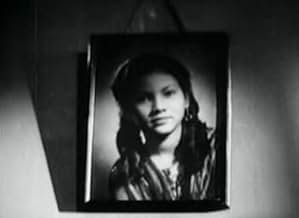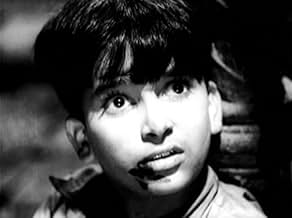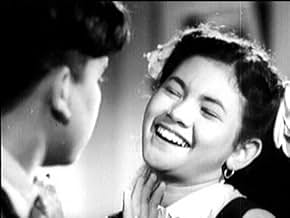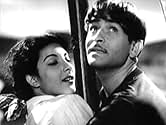NOTE IMDb
7,8/10
4,8 k
MA NOTE
Ajouter une intrigue dans votre langueA poor young man named Raj joins a criminal gang to feed his mother. But when he falls in love with Rita, he decides to reform himself for her.A poor young man named Raj joins a criminal gang to feed his mother. But when he falls in love with Rita, he decides to reform himself for her.A poor young man named Raj joins a criminal gang to feed his mother. But when he falls in love with Rita, he decides to reform himself for her.
- Réalisation
- Scénario
- Casting principal
- Récompenses
- 1 nomination au total
Prithviraj Kapoor
- Justice Raghunath
- (as Prithviraj)
Shashi Kapoor
- Young Raj
- (as Shashiraj)
Brij Mohan Vyas
- Dubey (Rita's Father)
- (as B.M. Vyas)
Leela Mishra
- Mr. Raghunath's Sister-In-Law
- (as Leela Misra)
Avis à la une
Raj Kapoor directs and stars in this classic Bollywood drama, which looks at the complicated lives of a poor man (Kapoor) and a privileged woman (Nargis). In Hindi with English subtitles.
This is the fifth collaboration between the two leads and this is one film from Indian cinema that I absolutely loved from start to finish the first time and exactly the same result occurred on a re-watch.
Kapoor gives a very good performance starring as Raj Raghunath, the man who is about to have one big moment of truth in the courtroom after he kills a criminal. Preparing to take the case to court, he is backed by his lawyer Rita (Nargis), who also happens to be his long-lost love.
Kapoor suits his role very well and makes the most of the time he has on the screen, while Nargis offers really good support in her role as the woman who is strongly prepared to defend Raj in court.
Elsewhere, there are strong supporting performances to be had from Prithviraj Kapoor and Leela Chitnis in their respective roles as Judge Raghunath and Leela Raghunath. Judge is the man taking charge of the latest proceedings at the latest case in the courtroom, while Leela is the woman who is thrown out of the house as it is believed she is up to no good...
Keep an eye out for Shashi Kapoor who appears as the younger version of Raj.
The direction from Raj Kapoor is excellent because he allows the facial expressions to be seen to a strong effect throughout, as well as keeping a very good pace going from start to finish, while the script is very well written by Khwaja Ahmad Abbas as he makes the movie easy to follow.
The technical aspects that stand out best are the set, camera and music, because the set is decent to view throughout, while the camera makes good use of the locations and the music is enjoyable to listen to.
Overall, Awaara is one well-acted film which terrific performances from Raj Kapoor and Nargis and this is one film that can definitely keep you gripped. One of the best Bollywood movies to have been made in the year of this release.
This is the fifth collaboration between the two leads and this is one film from Indian cinema that I absolutely loved from start to finish the first time and exactly the same result occurred on a re-watch.
Kapoor gives a very good performance starring as Raj Raghunath, the man who is about to have one big moment of truth in the courtroom after he kills a criminal. Preparing to take the case to court, he is backed by his lawyer Rita (Nargis), who also happens to be his long-lost love.
Kapoor suits his role very well and makes the most of the time he has on the screen, while Nargis offers really good support in her role as the woman who is strongly prepared to defend Raj in court.
Elsewhere, there are strong supporting performances to be had from Prithviraj Kapoor and Leela Chitnis in their respective roles as Judge Raghunath and Leela Raghunath. Judge is the man taking charge of the latest proceedings at the latest case in the courtroom, while Leela is the woman who is thrown out of the house as it is believed she is up to no good...
Keep an eye out for Shashi Kapoor who appears as the younger version of Raj.
The direction from Raj Kapoor is excellent because he allows the facial expressions to be seen to a strong effect throughout, as well as keeping a very good pace going from start to finish, while the script is very well written by Khwaja Ahmad Abbas as he makes the movie easy to follow.
The technical aspects that stand out best are the set, camera and music, because the set is decent to view throughout, while the camera makes good use of the locations and the music is enjoyable to listen to.
Overall, Awaara is one well-acted film which terrific performances from Raj Kapoor and Nargis and this is one film that can definitely keep you gripped. One of the best Bollywood movies to have been made in the year of this release.
in the East of Europe, under the Comunist regime, the Indian films have had a special status. as alternative to the Soviet movies and propaganda shows. but, in same measure, for the social message. clear . for romanticism and music and charm of actors and dramatic situations. but Awaara was more than a successful Indian film. it was, and remains, an epic. because it gives the right perspective about ordinary, every day situations. because it reminds the joy of life and the deep pain.because it is , like the childhood fairy tales, story of courage and self determination and love difficulties , sacrifice and happiness. because it is nice and bitter and translation in image of known situations. and, sure, for Raj Kapoor. in the East , the Indian film was an open window. Awaara was, for years, one of the most convincing examples.
Awaara is a stunning example of full tilt filmmaking. Featuring superb (and appropriate) musical interludes by the Shankar-Jaikashan team, this film effortlessly blends a wide range of influences: noir, gothic horror, neo-realism, and the surrealism of Jean Cocteau all come into play. Raj Kapoor and Nargis are one of the finest screen couples of all time, equaling if not topping Jean-Louis Barrault and Arletty in Children of Paradise, another possible cinematic influence on Kapoor, who also directed. This is an exciting, moving, and unforgettable film.
This movie is itself a legend. In 1988 TRT (Turkish national television) was to show that film. As I was a little child I could not now about the movies but that day my mother, grandmother, my uncles wife all got together and prepared delicious foods, and watched that movie on TV. Perhabs on that day all women in Turkiye were watching that film.
Mavi Boncuk, a delicious movie has reference to this film. On that movie Munir Ozkul says: - Aaah Awaara (at the time he looks to Awaara's poster) I've grown my children by selling it's tickets, played for 6 months on those days.
It is a fact that Awaara was a great success, on those days a film was playing for only a week but Awaara was in vision for 6 great months. I only remembered a scene from the film I watched when I was 6 years old, this is the scene that Raju stole a watch. Then 3 years ago I bought this film and watched with friends, my friends were very impressed with the movie, and we watched again and again.
Awaara is a milestone for Turkish cinema, it is filmed again by great Turkish actor Sadri Alisik in 1966. Arabesk is stated to enter Turkiye with Awaara. Adalet Cimcoz and Ferdi Tayfur spoke Nargis and Raj Kapoor in Awaara's Turkish dubbing version and film is great with that excellent dubbing.
Films song is also sung in Turkish lyrics by Sadri Alisik and song was also a hit.
Mavi Boncuk, a delicious movie has reference to this film. On that movie Munir Ozkul says: - Aaah Awaara (at the time he looks to Awaara's poster) I've grown my children by selling it's tickets, played for 6 months on those days.
It is a fact that Awaara was a great success, on those days a film was playing for only a week but Awaara was in vision for 6 great months. I only remembered a scene from the film I watched when I was 6 years old, this is the scene that Raju stole a watch. Then 3 years ago I bought this film and watched with friends, my friends were very impressed with the movie, and we watched again and again.
Awaara is a milestone for Turkish cinema, it is filmed again by great Turkish actor Sadri Alisik in 1966. Arabesk is stated to enter Turkiye with Awaara. Adalet Cimcoz and Ferdi Tayfur spoke Nargis and Raj Kapoor in Awaara's Turkish dubbing version and film is great with that excellent dubbing.
Films song is also sung in Turkish lyrics by Sadri Alisik and song was also a hit.
Musicals in America in their heyday were mostly about the lives of prominent show business personalities or small town middle class Americana, never about the outcast or the urban slum dweller. This is not the case with the films of Indian director, Raj Kapoor, especially in Awaara, a 1951 film and the later Boot Polish. These films call attention to the less fortunate and, in the case of Awaara, the vagabond whose life of crime is the inevitable outcome of growing up in the slums.
In Awaara, Kapoor's real father (Prithviraj Kapoor) plays a heartless judge who accuses his pregnant wife (Leela Chitnis) of infidelity after she was kidnapped by bandits and throws her out of his home (the logic of this eludes me since she was already pregnant when kidnapped). The stern judge staunchly believes that a thief's son will always be a thief and a good man's son will always turn out good. In a series of flashbacks, the film dramatizes the unfortunate consequences of this belief system. Raju, played by the director Raj Kapoor as an adult and by his brother Sashi Kapoor as a child, is born on the streets and grows up in the slums.
Under the guidance of a ruthless bandit named Jagga (K. N. Singh), he turns to stealing to help support his mother. Raj has little to comfort him except for a picture hanging on the bare walls of his house of Rita, his childhood sweetheart played by the stunning Nargis, a real life lover of Kapoor. The romance between Raj and Rita is one of the central motifs of the film and the chemistry between the two is electric. This is especially evident in the boat scene where she performs an exotic dance to the Dum Bhar song, and after she calls him a junglee (savage) and he slaps her in an incident that serves to bring them closer together.
Raju, the tramp, is forced to live on his wits but does so with humor and a Chaplinesque charm. When he finds out the true circumstances of his childhood, however, he sets out to get revenge against his father, the judge, and ends up facing a charge of attempted murder in the judge's own courtroom. Rita, a lawyer herself, defends him as she promised she would years ago. She puts the judge on the witness stand and asks pointed questions about how he condemned his wife and child to a lifetime of poverty. Rita holds him and society responsible for the conditions that led Raju to commit his crime and asks the judge to forgive him and admit that Raju is his son. Raju, in turn, offers an impassioned plea to the court to punish him as a criminal but not to neglect the conditions that gave rise to his life of crime. In the end, a very moving scene of attempted reconciliation between father and son had me wiping away the tears.
Awaara is reminiscent of both 40s film-noir with its dark cobblestone streets and menacing shadows and, in its social conscience, of the great Italian neo-realists like de Sica. But basically, Awaara is still in the Bollywood tradition; that means drama, romance, music, comedy, and action -- all put together in a total package to appeal to a wide audience. With great songs and dances, amazing dream sequences, style and panache, strong drama, and an inspiring message, it is not surprising that Awaara became one of the most popular films in Indian cinematic history. It is one of my favorites as well.
In Awaara, Kapoor's real father (Prithviraj Kapoor) plays a heartless judge who accuses his pregnant wife (Leela Chitnis) of infidelity after she was kidnapped by bandits and throws her out of his home (the logic of this eludes me since she was already pregnant when kidnapped). The stern judge staunchly believes that a thief's son will always be a thief and a good man's son will always turn out good. In a series of flashbacks, the film dramatizes the unfortunate consequences of this belief system. Raju, played by the director Raj Kapoor as an adult and by his brother Sashi Kapoor as a child, is born on the streets and grows up in the slums.
Under the guidance of a ruthless bandit named Jagga (K. N. Singh), he turns to stealing to help support his mother. Raj has little to comfort him except for a picture hanging on the bare walls of his house of Rita, his childhood sweetheart played by the stunning Nargis, a real life lover of Kapoor. The romance between Raj and Rita is one of the central motifs of the film and the chemistry between the two is electric. This is especially evident in the boat scene where she performs an exotic dance to the Dum Bhar song, and after she calls him a junglee (savage) and he slaps her in an incident that serves to bring them closer together.
Raju, the tramp, is forced to live on his wits but does so with humor and a Chaplinesque charm. When he finds out the true circumstances of his childhood, however, he sets out to get revenge against his father, the judge, and ends up facing a charge of attempted murder in the judge's own courtroom. Rita, a lawyer herself, defends him as she promised she would years ago. She puts the judge on the witness stand and asks pointed questions about how he condemned his wife and child to a lifetime of poverty. Rita holds him and society responsible for the conditions that led Raju to commit his crime and asks the judge to forgive him and admit that Raju is his son. Raju, in turn, offers an impassioned plea to the court to punish him as a criminal but not to neglect the conditions that gave rise to his life of crime. In the end, a very moving scene of attempted reconciliation between father and son had me wiping away the tears.
Awaara is reminiscent of both 40s film-noir with its dark cobblestone streets and menacing shadows and, in its social conscience, of the great Italian neo-realists like de Sica. But basically, Awaara is still in the Bollywood tradition; that means drama, romance, music, comedy, and action -- all put together in a total package to appeal to a wide audience. With great songs and dances, amazing dream sequences, style and panache, strong drama, and an inspiring message, it is not surprising that Awaara became one of the most popular films in Indian cinematic history. It is one of my favorites as well.
Le saviez-vous
- AnecdotesIn Awaara, there are three genaration of the Kapoor family in the film. There is Deewan Kapoor in the film, who was the grandfather of Raj Kapoor (father of pritviraj ) who plays the role of judge, who comes in the beggining of the film and in the end, then Raj Kapoor's father, Pritviraaj and also his young brother, Shashi Kapoor (junior raj kapoor ) were also in this film. As a filmaker this was Raj Kapoor, his third film. This film got very famous in Russia. In a outdoor scene of Raj with Nargis, in the background, the music of the song ' na mangu sona chandi' could be heard there, 20 years later this tune was used in a song of. Bobby.
- ConnexionsFeatured in Century of Cinema: 100 ans de cinéma: 100 ans de cinéma indien (1996)
- Bandes originalesAwara Hoon
Sung by Mukesh
Music composed by Shankarsingh Raghuwanshi and Jaikishan Dayabhai Panchal (as Shankar-Jaikishan)
Lyrics by Shailendra
Meilleurs choix
Connectez-vous pour évaluer et suivre la liste de favoris afin de recevoir des recommandations personnalisées
- How long is Awaara?Alimenté par Alexa
Détails
- Durée3 heures 13 minutes
- Couleur
- Rapport de forme
- 1.37 : 1
Contribuer à cette page
Suggérer une modification ou ajouter du contenu manquant



